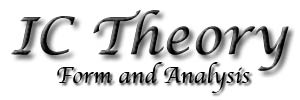

Examination of the traditional techniques of musical form and structure and their application to compositions from primarily the eighteenth and nineteenth centuries. Prerequisite: 551-23200 or 551-23600. 2 credits. (F–S)
Instructor Information
| Dr. Timothy Nord | Office: | 2202 Whalen Center |
| Email: | nord@ithaca.edu | |
| Phone: | 274-3389 | |
| Office Hours: | Monday 2:00 | |
| Thursday 1:00 | ||
| Friday 9:00 |
Required Materials
Arlin, Mary I., et al. Music Sources, second edition
Clendinning, Jane and Elizabeth Marvin The Musician’s Guide to Theory and Analysis, third edition; “package” of textbook, workbook, and anthology
Evaluation
| Homework | 40% |
| Unit I Exam | 15% |
| Term Paper | 15% |
| Final Exam | 30% |
NOTE: The final exam will be on Monday, Dec. 16, 2019, TBA. Make your travel arrangements accordingly. You may not take the final at any other time.
Attendance Policy
In accordance with the attendance policy printed in the Ithaca College Student Handbook, you are expected to attend all classes.
Assignments
Assignments will be handed out in class. All assignments are due at the beginning of the next class unless otherwise noted. Late assignments will be accepted up to the beginning of the class one week after the assignment is given with an automatic 20% reduction in the grade. After that, the assignment will not be accepted for a grade and the grade of 0 will be entered for that assignment. If you are absent from class (excused or unexcused), the assignment is still due and it is your responsibility to make the necessary arrangements to get the assignment submitted on time. All assignments must be submitted on paper, do not email me scans of your work.
Tentative Course Outline
| Unit I | Variations and Rondo | Aug. 28 - Sept. 27 |
| Unit I Exam | Wednesday, Oct. 2 | |
| Unit II | Sonata Form | Sept. 30 - Nov. 8 |
| Unit III | Counterpoint | Nov. 11 - Dec. 13 |
| Ithaca College offers a wide variety of support services. Please talk with your advisor if you have a concern in any of these areas. |
| Counseling Center |
|
"Diminished mental health, including significant stress, mood changes, excessive worry, or problems with eating and/or sleeping can interfere with optimal academic performance. The source of symptoms might be strictly related to your course work; if so, please speak with me. However, problems with relationships, family worries, loss, or a personal struggle or crisis can also contribute to decreased academic performance. Ithaca College provides a Counseling Center to support the academic success of students. The Counseling Center provides cost-free services to help you manage personal challenges that threaten your well-being. In the event I suspect you need additional support, I will express my concerns and the reasons for them, and remind you of resources (e.g., Counseling Center, Health Center, chaplains, etc.) that might be helpful to you. It is not my intention to know the details of what might be bothering you, but simply to let you know I am concerned and that help, if needed, is available. Getting help is a smart and courageous thing to do -- for yourself and for your loved ones.” |
| Support Services |
| "In compliance with Section 504 of the Rehabilitation Act of 1973 and the Americans with Disabilities Act, reasonable accommodation will be provided to students with documented disabilities on a case-by-case basis. Students must register with the Office of Student Disabilities Services and provide appropriate documentation to the College before any academic adjustment will be provided." |
| Academic Enrichment Services |
| “Academic Enrichment Services offers individual and group tutoring as well as supplemental instruction in select first and second year barriers to major courses. They hold academic success workshops and small-group seminars on transition from high school to college-level academics. Students can also benefit from individual consultation with professional staff and student academic coaches on matters such as time management, goal-setting, academic motivation, note-taking, effective listening, learning styles assessment, etc….” |